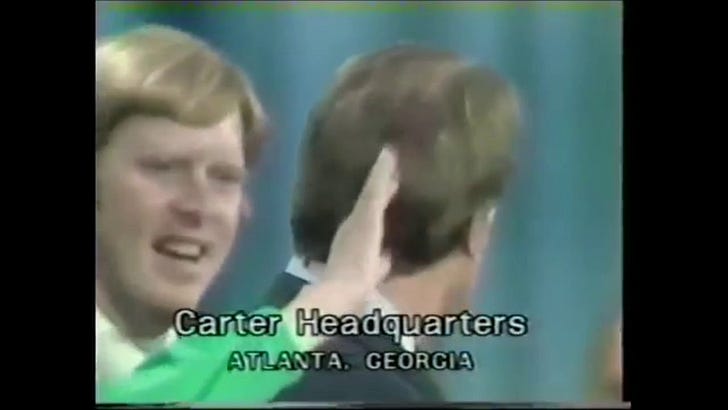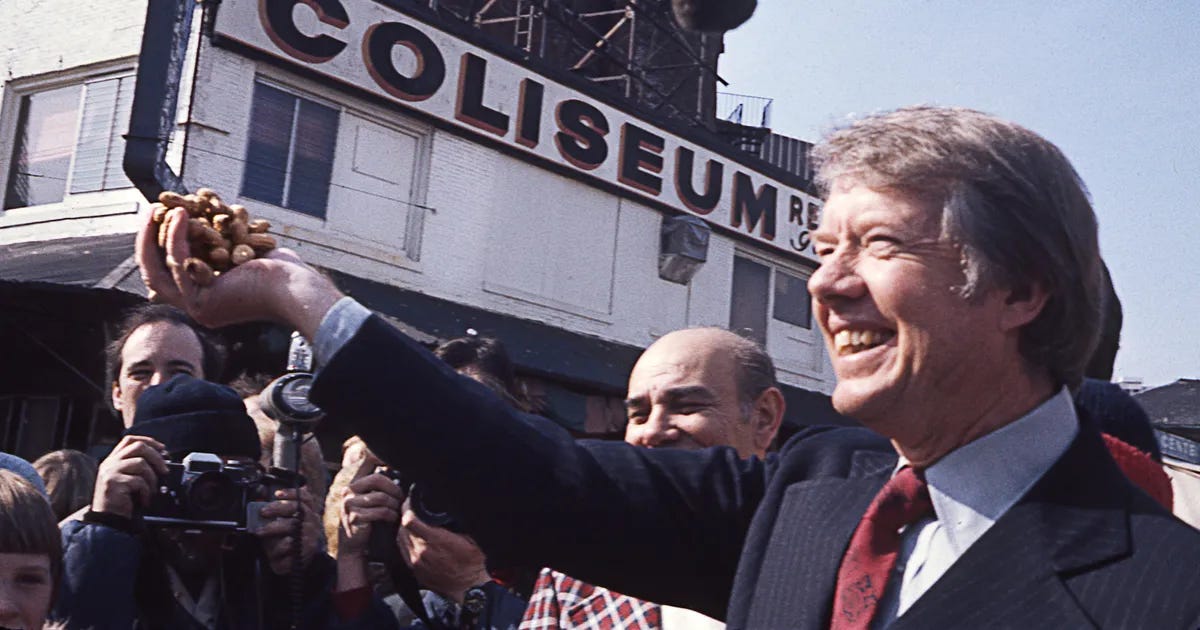The Outsider: How Jimmy Carter Wrote The Insurgent Blueprint in 1976
The Peanut Farmer from GA invented Iowa momentum, outfoxed a conservative CA governor and beat the unelected president in one year.
Election Night. 1976. Atlanta, GA.
That’s a golden moment. The kind you make statues out of.
The kind of moment you think about when you are almost out of moments.
Jimmy Carter entered home hospice this week. At 98, he is the oldest living president. While his presidency is controversial, the way he got there is indisputable.
A year prior to America’s bicentennial election night, Jimmy Carter didn’t have a national profile. He was just a name amongst many other names to see who would challenge the flailing post-Nixon Republican party.
So we can honor the man while we still can, this is the story of 1976
So let’s start here. It’s 1968 at the Democratic National Convention and it’s a total mess. Delegates are pushing each other, there is violence in the street and police have to be called. The Democrats have come a long way from Jack Kennedy and his High Hopes.
The fight is about a million little things (including Vietnam) and but there is one big thing: Someone tried to cut the line. Or rather, did what they’ve done their entire political lives. See, we can’t even get it straight here.
Listeners to my first season of Raise the Dead know this story but in 1960 the Kennedy family had a revolutionary idea. Instead of coming to the party convention and trying to convince a bunch of party insiders who hate him to back him, they’d do what most thought to be stupid. Run in primary contests. The reason many knew this to be a stupid plan is back then, you couldn’t win enough delegates in the primary contests to secure the nomination. So if you did run, you better be sure to win. Otherwise you’d have a loss on your record which is more than the politicians who decided to do nothing. The Kennedy’s decided that while he wouldn’t have enough delegates to win outright, but he’d have a head start and political momentum. In an age of television, a perfect primary record could create a better case than anyone else. They were right. Jack won the nomination, Jack won the presidency.
Then we have the bizarre 1964 election after Kennedy’s assasination.
And then this… 1968.
There are two leading candidates in 1968: Eugene McCarthy, who participated and won several primaries. And Hubert Humphrey who didn’t enter into a single primary.
Humphrey got the nomination. People were cheesed off. Oh, and they didn’t want to die in Vietnam.
This leads to the McGovern-Fraiser Commission which essentially incentivizes state parties to have primaries. This puts more delegates into play and allows for an ambitious candidate to choke out rival candidates path to the nomination. It’s truly a revolution.
McGovern leaves the commission before it’s done to run for president and gets rolled by Nixon in 1972. Whoops.
Which brings us to 1976.
Here is the state of play for the Democratic nomination. Leading into the 1976 election there is one Democrat polling ahead of the field: Ted Kennedy.
The love affair with the Kennedy family never fully dimmed. You could argue it still hasn’t.
Not after JFK was murdered. Not after Bobby was murdered. And not even after Ted Kennedy’s Chappaquiddick incident in 1969. For those too young, here is the Cliff Notes on that: Ted Kennedy is driving back from a party with a woman who is not his wife, late at night. His car goes off a bridge. Ted escapes, the woman does not. She dies and he does not notify the authorities until the next morning.
Basically, it’s the season one finale of Succession.
Here is Ted in 1969 discussing the event…
It’s the kind of character staining incident that would kill a political career. For anyone not named Kennedy. Democrats are desperate to regain that feeling they had in 1960 and despite national embarrassment, many partisans believe 1976 is Ted’s time.
But with a renewed interest in the story. Ted pulls out of 1976 contention.
If not Kennedy, George Wallace is also polling well…
Remember! The Democratic party is different back then! That is Wallace being inaugurated as Governor of Alabama back in 1963 and punctuating it with the famous phrase “Segregation then. Segregation now. Segregation forever.”
Narrator: It wasn’t.
By this primary, Wallace has moderated on segregation. Following the liberalizing of his party, he says he’s a moderate on racial issues but a conservative Democrat all around. Still, the man is older than dirt and this is his fourth try at the White House. Not exactly fresh.
Speaking of not fresh… Hubert Humphrey! This dude lost to JFK in 1960, went to the White House with LBJ in 1964 and spent the rest of his political career trying to get back. Still, the field for the nomination is so chaotic, Humphrey notches a few polling wins in the mid-20s and low-30s. Still, announcing another run in 1976 would be a bridge too far. So Humphrey, who was of the generation that the Baby Boomers called Boomers, did the most Humphrey thing of all… just waited to be drafted at the convention.
And he’d keep waiting. And waiting. And waiting.
On a cold clear night, some say you can still hear him waiting.
So if those are all the people who didn’t run, who actually ran in these primaries?
That is Arizona Senator Morris “Mo” Udall of Arizona. He made the decision that these days feels like a perfunctory move: he was going to run in the Iowa Caucus. Remember that until the commission, the Iowa Caucus was just like any primary. It didn’t mean much because you could still just win the nomination at the convention. But now momentum is the only currency and the first contest is the place where it all starts.
And yet! Aside from Mo and Jimmy Carter along with one other candidate. All the others, including George Wallace, decided to save their powder for other contests.
But the retail politics that Iowa is now famous for was first exploited by the Peanut Farmer from Georgia. Here is a local PBS retrospective about that campaign…
Carter comes second to “Uncommitted” in Iowa. Not ideal but pretty freaking good! And now the national media has a darling. A charismatic character from Georgia who will talk to anyone who listens. And the momentum continues. Carter takes New Hampshire, the next major contest. By the time Sen. Henry “Scoop” Jackson enters the race in Massachusetts he is only stepping on to the course to get run over. Carter takes Vermont, Florida, North Carolina, Wisconsin, Texas, Georgia, Indiana and Washington D.C.
One by one, the rest of the challengers that started the race drop off. And now, the inflection point. Whenever there is a candidate that is unknown to the party leadership, there is an inevitable antibody that seeks to attack it. The Stop “Candidate” movement.
This fails a lot more often than it works. Failed against Barry Goldwater, failed against Trump. But it worked against Bernie in 2020. Organize around one option and put all of your effort into it.
In 1976 the most popular late-comer was California Governor Jerry Brown. Want to know how beloved he is by the establishment? Here is a 1976 report by 60 Minutes…
But despite a late run at the nomination and a few wins late in the primary season. No one could outpace what Carter had done. And so in New York City at the Democratic National convention the Democrats had what they’d lacked for eight years… unity. Carter had the delegates and all that remained was picking a running mate which he did with Walter Mondale, a Minnesota Liberal and protege of Hubert Humphrey.
With the general in sight… we can now take a moment to bask in the glory of mid-70s campaign advertising.
God, I long for a bygone era where the mother of a candidate swears she never hit her son because she left that to his father. But that ad (the second in the medley above) pretty much sums up Jimmy’s pitch to America. I am a simple farmer, not a politician. I want competent government free from scandal, something America was sick of post Nixon and hadn’t gone away after Ford pardoned the disgraced former president.
Carter is simply a reset button. But more than that… possibly a new mold of politician. Listen to that ad and tell me you don’t see the blueprint Bill Clinton took to two terms.
Meanwhile on the other side of the ballot, take a look at the Ford ads.
After the 1976 Democratic National Convention, Jimmy Carter held a sizable 33-point lead over incumbent President Gerald Ford in national polls. However, as the general election campaign wore on through the fall, Ford was able to significantly narrow the gap.
A few events contributed to Ford's gains. In September, Carter participated in the first televised presidential debate since 1960. While Carter's performance was not disastrous, Ford was widely viewed as the winner of the debate. Ford effectively criticized Carter as lacking the necessary experience and being vague on key issues. The debate helped shift the race in Ford's favor.
Additionally, a controversial Playboy magazine interview with Carter was published during the campaign. In the interview, Carter admitted "I've looked on a lot of women with lust. I've committed adultery in my heart many times." Carter's comments were seen as inappropriate by some voters, especially women and evangelical Christians, and may have cost him some support.
However, Ford's progress was halted by a serious gaffe of his own making. In the second presidential debate in early October, Ford asserted "There is no Soviet domination of Eastern Europe, and there never will be under a Ford administration." He claimed countries like Poland did not see themselves as under Soviet control. Ford refused to retract the statement for nearly a week, despite criticism. His misstatement and stubbornness stalled his gains in the polls, allowing Carter to maintain a modest lead through Election Day.
Which brings us here, Election Night 1976.
In the end, Carter won a close victory over Ford, taking 297 electoral votes to Ford's 240. Carter was able to hold on thanks in part to Ford's damaging mistake late in the campaign, which prevented Ford from fully capitalizing on events that had shifted momentum in his favor.
For whatever happened afterward, and Carter’s presidency is too often written as a prologue to the Reagan Revolution, there is no doubt that Carter’s blueprint an insurgent candidate can be seen in today’s landscape.
Most recently, it was Candidate Pete Buttigieg in 2020 positioning himself a common-sense moderate who was untainted by Washington.
It should be no surprise that one of the last conversations Buttigieg had a 2020 candidate was with… Jimmy Carter.
The original outsider.
The primary primary candidate.
Jimmy Carter.
(If you would like to listen to this in podcast form, please find it here)






